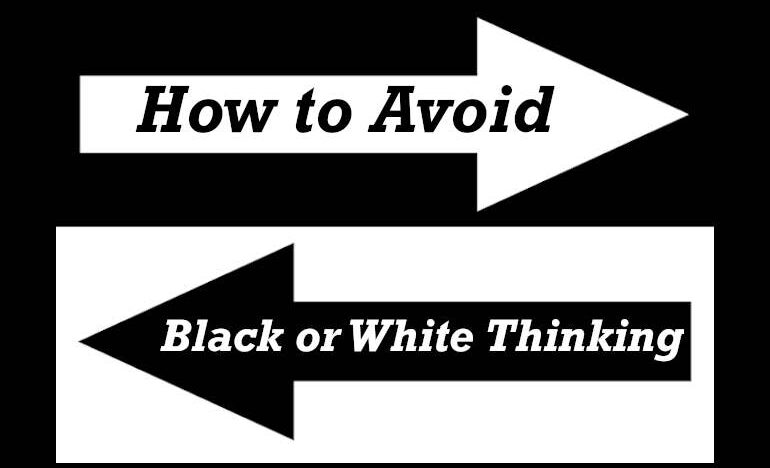How to Avoid Black or White Thinking

An Assembling God’s Puzzle video
By Fr. Garry Richmeier
One human characteristic that we all have to deal with is our love of defining the world in black or white, either/or terms. It is a piece of the human puzzle that seems to be in our DNA somewhere. It’s almost an automatic way of perceiving reality, even when we can logically explain why it doesn’t make sense.
It often causes us problems because the world cannot be divided up neatly into black and white categories. There are usually shades of gray between the black and white.
This becomes obvious when you ask a question like “Are you a good person or a bad person?” We all know we probably fall in between those two ends of the spectrum. And when we insist on describing things and people in simple either/or terms, we automatically have a skewed view of reality, and it causes us problems.
Examples of black and white thinking abound. In this election year, people will consider you a Democrat or a Republican. Even if you say you are an independent, and you tell people how you vote on specific issues, they may easily say “Oh, you’re really a Republican (or Democrat).” They need you to be one or the other, not in between somewhere.
Religions are notorious for black and white thinking. Many have their own version of “This is what God says and all other views are wrong.” Of course, going to heaven or hell is the ultimate religious either/or idea.
Racism has its own version of this type of thinking. A person can be of mixed race, but they are often classified as one specific race depending on appearance. And a person from India, a person from Nigeria, and a person from Chicago, may easily be lumped together as “black” by some.
We like black and white explanations of reality because they make things simple. They allow us to compartmentalize things in nice, neat categories that fit together perfectly to explain the world. They are a sort of shorthand that saves us the trouble of having to delve into the nuances and details and ambiguities of things. But these ambiguities are part and parcel of the world.
We want quick sound bites that tell us what is right/wrong, good/bad, what fits/what doesn’t, who’s in/who’s out, who’s good/who’s bad, etc. This provides us with a sense of certainty and security, but it is a false sense of security, and comes with a price.
It dooms us to a life of adversarial conflict, trying to get rid of half of reality (including people) that is “bad” or doesn’t fit. It’s pretty much impossible to be at peace or happy while fighting half of reality.
So what can we do with this human tendency so it causes fewer problems? First of all, we have to nurture a genuine sense of humility, which means continually reminding ourselves that there is more to reality than we can ever fully comprehend or know. And it means understanding that no political party, no religion, no interpretation of one’s preferred holy writings, and no scientific theory can fully explain reality.
This can help us to continue exploring and growing in our understanding of the world instead of settling on one view that we think explains it all. It is also helpful to be wary of explanations and descriptions of people and events that purport to be too clear, authoritative, and conclusive. Such sources of information tend to be selective in giving one side of the issue while ignoring other aspects involved.
Also helpful is nurturing a healthy sense of curiosity. A curious person is always interested in what they do not yet know or have not experienced. It is generally a good companion to a genuine sense of humility.
In more philosophical terms, avoiding black and white thinking means accepting that reality is full of opposites, and always will be. Accepting this fact, rather than fighting to get rid of one side or the other, helps us. It is possible to follow the way that seems to be the best (most helpful, loving, good, sensible) without fighting the opposite. Fighting the opposite is basically wasting energy that we could use to do what we think is best.
Richard Rohr says it this way: “The best criticism of the bad is the practice of the better.”
“Practicing the better” keeps us focused on what is important and what is possible, and relieves us of wasting energy fighting the opposite. That feels much better, is more rewarding, and enables us to do much more good in the world.
All of the videos in this series can be found here: Assembly God’s Puzzle.
Never miss an article published on the Renewal Center website: Sign up to receive our newsletters.
[Fr. Garry Richmeier, a Precious Blood priest and spiritual director, holds a Master’s of Divinity Degree from St John’s University in Collegeville, Minnesota, and a Master’s of Counseling Psychology degree from the University of Missouri-Kansas City. He is a licensed professional counselor and a licensed marriage and family therapist.]
We’d Like to Hear from You!
We’d like to know what you think about this article. Send us a comment using the form below. Do you have a suggestion? Is there something you want to learn more about? Send us a note.
Related

Take Nothing for the Journey
An Assembling God’s Puzzle video
By Fr. Garry Richmeier, C.PP.S.
Jesus’ teaching about what to take on a journey — nothing — is actually good advice for building trusting relationships. Don’t bring your “stuff” into the relationship; listen deeply and respec their views and situation, understand their struggles.

Pilgrims of Hope, Episode 6: Walking with Cancer Survivors
Hosted by Fr. Ron Will, C.PP.S.
We are talking with people who find hope amid difficult circumstances or bring hope to others. In this episode, Kathy Keary talks about how centering prayer, journaling and other spiritual practices helped her cope with two life threatening health issues.
Categories
Assembling God's Puzzle Coffee with Padre Cooking & Spirituality Encounters of the 4th Kind Family Matters Reflections on the Eucharsitic Prayers Spiritual Resources Taize Prayers The Contemplative Life Traveling with Pilgrims of Hope Uncategorized Videos Week of Prayer for Uhristian Unity When you need a little help
